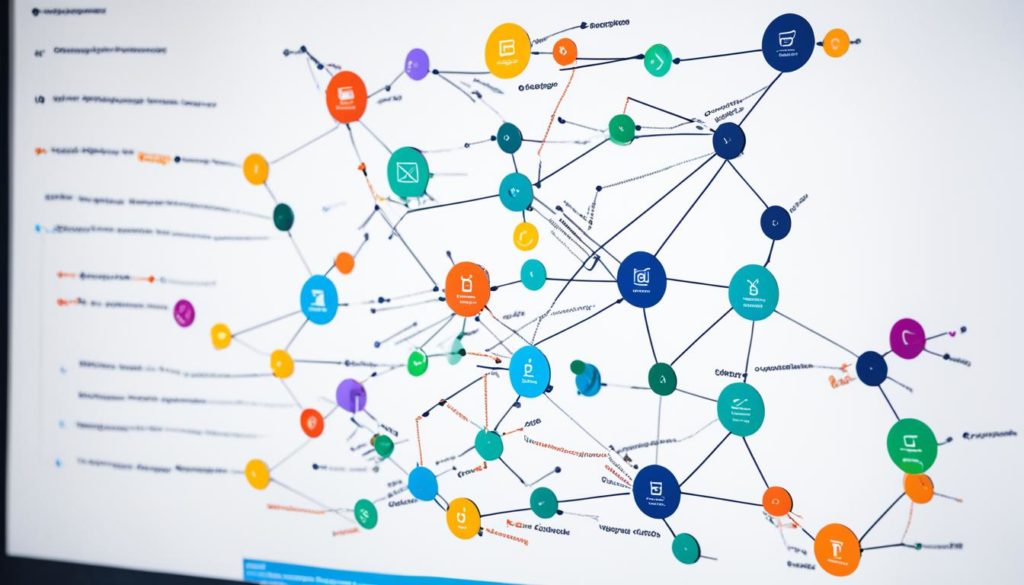
Over 30 million developers across the globe use Git for version control. This huge number shows how important version control systems are in making software. With Git vs GitHub vs GitLab, developers can easily track changes, work together, and use powerful CI/CD pipelines.
It’s key to understand Git, a distributed version control system, for modern software making. But what about GitHub and GitLab? These platforms have different functions. GitHub is known for hosting open-source projects and team work. GitLab is recognized for its all-in-one DevOps solutions, simplifying the Software Development Life Cycle (SDLC).
We will explore these developer tools. We’ll talk about their main differences and advantages. This will help you know which to choose and improve how you make software.
Key Takeaways
- 30 million developers rely on Git for version control worldwide.
- Git helps track changes and fosters teamwork.
- Both GitHub and GitLab offer hosting for Git repositories.
- GitHub is great for open-source projects and community collaboration.
- GitLab brings together strong DevOps and CI/CD tools.
- Comparing them closely reveals their unique features.
Introduction to Version Control Systems
In the fast-paced world of software development, version control systems are key. They ensure projects move smoothly and efficiently. They help manage different versions of a project and improve team collaboration.
What is a Version Control System?
A version control system is a tool for tracking and managing software code changes. Git is a key example. It keeps a history of code changes, allows branching for different features, and makes merging easy.
With version control, developers can go back to older code if problems pop up. This makes complex projects easier to manage.
Importance in Software Development
Version control boosts SDLC efficiency. It lets many developers work on the same project without issues. They don’t overwrite each other’s work.
Version control also helps with continuous integration and deployment. This leads to a more efficient development cycle. Tools like Git change how teams work together. They make workflows smoother and products better.
| Feature | Benefit |
|---|---|
| Collaboration | Allows multiple developers to work together without conflicts |
| History | Maintains a detailed record of changes for future reference |
| Branching and Merging | Facilitates the development of new features independently |
| Resilience | Provides a fallback mechanism by reverting to previous versions |
What is Git?
Git is a powerful, open-source version control system. It handles projects of any size with speed and efficiency. It lets many developers work on the same project without issues. Git stores projects in local repositories, keeping project integrity and history safe.
Features of Git
Git’s snapshot feature is standout. It stores every project version individually. This lets developers go back to previous states easily. It helps in tracking changes and managing versions.
Git also has great branching and merging functions. These make it easy for team members to handle different tasks at once. Other key features include detailed access control and its distributed nature. These elements boost teamwork and project handling.
Benefits of Using Git
Using Git goes beyond its tech abilities. It supports collaboration and gives everyone up-to-date access. This open-source system works well across various platforms.
Git’s structure cuts down on integration problems. It’s especially helpful in large, complex projects where keeping data safe is key. The advantages of Git are clear here.
Git’s wide use also comes from its free GPLv2 license. Plus, tools like Git prevent issues that centralized systems face. This makes Git reliable and popular.
Git vs GitHub vs GitLab
When comparing Git, GitHub, and GitLab, there are noticeable differences and overlaps. GitHub and GitLab each have their own set of features. These cater to different needs in the software development world.
GitHub
Microsoft owns GitHub. It’s a major player among collaboration platforms with over 100 million users. GitHub allows endless public repo storage and up to 500MB for private ones. Its rich ecosystem of third-party integrations and a lively marketplace with thousands of apps stand out. The StackOverflow 2022 Developer Survey shows many developers use GitHub for work and personal projects. Key features include:
- Ownership: Microsoft
- Publicity: 100M+ users
- Repository Storage: Unlimited (public), 500MB (private)
- CI Compute Minutes: Unlimited (public), 2000 minutes (private)
- Maximum Collaborators: Unlimited
GitLab
GitLab, owned by GitLab Inc., caters to around 30 million users. It’s noteworthy for its built-in CI/CD pipeline. This feature eliminates the need for external services. GitLab also excels in self-hosting and DevOps with its comprehensive tools for project handling. It allows up to 5GB for public repo storage. Features like epics and boards for various project management styles are included. Find more details in this comparison.
- Ownership: GitLab Inc.
- Publicity: About 30M+ users
- Repository Storage: 5GB (public/private)
- CI Compute Minutes: 400 minutes (public/private)
- Maximum Collaborators: Unlimited (public), 5 (private)
- OpenSource Program: Perks worth $100/seat/month
For more details, check the comparison of these platforms’ features. The choice between GitHub and GitLab depends on your project’s needs. Factors include the necessity for many third-party integrations or a unified platform with integrated CI/CD and self-hosting.
Comparing Features of GitHub and GitLab
When choosing between GitHub and GitLab, it’s key to know their different features. We’ll look at free vs. paid versions, CI/CD tools, and community support.
Free vs. Paid Versions
GitHub and GitLab offer different things for free and paid versions. GitHub has a basic free plan with some limits. It makes users consider the paid options.
GitLab’s free plan is bigger and helps small teams by giving more for less money. Whether the free or paid version is better depends on your project’s needs and budget.
CI/CD Capabilities
CI/CD tools are vital in comparing GitHub and GitLab. GitLab has built-in CI/CD tools. This ease helps developers use continuous integration and deployment easily.
GitHub added GitHub Actions to keep up. It’s powerful but needs more setup. Looking at CI/CD tools helps you pick the right platform for your workflow.
Community and Support
The community is also important in making your choice. GitHub has more users and more open-source projects. This creates a big support community.
GitLab’s community is smaller but very active and helpful. Both offer good customer support. The size and activity of their communities might help you decide.
| Feature | GitHub | GitLab |
|---|---|---|
| Free Plan | Basic features, private repositories | Comprehensive features, private repositories |
| Paid Plan | Enhanced with advanced functionalities | Enhanced with more extensive toolkits |
| CI/CD Tools | GitHub Actions | Built-in CI/CD tools |
| Community Size and Support | Larger user base, extensive resources | Engaged community, responsive support |
In summary, carefully consider these features according to your team’s needs. Think about free vs. paid, CI/CD tools, and community support. Comparing GitHub and GitLab will guide you to the best choice for your goals.
Key Differences Between GitHub and GitLab
GitHub and GitLab handle authentication and security differently. GitHub uses role-based authentication, assigning user permissions by roles. On the other hand, GitLab uses owner-controlled access. This gives owners more control over repository access, enhancing security.
Authentication Levels and Security
GitLab, founded by Dmitriy Zaporozhets and Valery Sizov, is seen as more secure. This is partly because it’s open-source. Managed by GitLab Inc., it allows for detailed permission settings. GitHub, started by Chris Wanstrath and others, is now under Microsoft. Unlike GitLab, it’s not open-source but offers ways to protect sensitive info. Learn more about their security by reading GitHub vs GitLab differences.
Data Import/Export and Attachments
GitHub and GitLab also differ in how they handle data and attachments. GitLab provides tools for easy data import/export. This includes moving repositories and projects seamlessly. GitHub, however, has limitations with its GitHub Imported tool, making data transfer more difficult.
GitLab allows various attachment types, which benefits project dynamics. GitHub, in contrast, limits attachment types. This can affect project needs. These differences show how each platform manages data and attachments, impacting user experience and project scope.
For a deeper understanding of GitHub vs GitLab differences, consider how these platforms’ data handling affects projects and developer preferences.
| Feature | GitLab | GitHub |
|---|---|---|
| Developer/Owners | Dmitriy Zaporozhets, Valery Sizov | Chris Wanstrath, Tom Preston-Werner, P.J. Hyett, Scott Chacon |
| Company Ownership | GitLab Inc. | Microsoft Corporation |
| Open Source | Yes (Community Edition) | No |
| Data Import/Export | Comprehensive Tools | Restrictive – GitHub Imported Tool |
| Attachment Support | Yes | No |
| Security Permissions | High-level user control | Role-based authentication |
The technical GitHub vs GitLab differences outline each platform’s unique strengths. Whether you need advanced security or better data handling, understanding these details will guide your platform choice for development projects.
Conclusion
We’ve learned a lot about Git, GitHub, and GitLab. Each one has special benefits for different projects and what developers like. It’s key to know these differences to pick the right tool for managing your code. GitHub started in 2008 and Microsoft bought it in 2018. It has a big open-source community. According to a survey in 2022 by Stack Overflow, 87.02% of users prefer it for personal projects.
GitLab was created in 2011. It focuses on DevOps and CI/CD, making it great for managing projects and continuous integration. GitHub offers a free model and lots of plugins. GitLab gives an all-in-one DevOps solution and lets businesses host it themselves. This offers more control.
If you want to learn more, check out different discussions and comparisons. You can start with this analysis.
In the end, whether you go for GitHub or GitLab, think about what your team and project need. Using the detailed features of each, you’ll find the best tools to help your development work.
FAQ
What are the key differences between Git, GitHub, and GitLab?
Git is a system for tracking code changes. GitHub and GitLab are places to store Git projects. GitHub is great for community and adding tools, and GitLab is good for doing everything in one place and working by yourself.
What is a Version Control System (VCS)?
A Version Control System lets people manage code changes over time. It helps many developers work together on the same project. It’s key for organizing work and keeping the code safe.
Why are version control systems important in software development?
They let teams work together without problems. They track progress, fix bugs, and undo changes. This keeps projects running smoothly and stably.
What are the key features of Git?
Git has many features like branching, merging, and storing snapshots. It lets people work together well. It’s great for both big and small projects.
What are the benefits of using Git?
Git makes working together easier, keeps versions in order, reduces problems when combining changes, and keeps code quality high. It’s also free and widely supported.
What are some unique features of GitHub?
GitHub has a big community, lots of extra tools, and teamwork features like pull requests and issue tracking. It has plans for all kinds of users.
What makes GitLab stand out?
GitLab is a complete package with CI/CD tools and the option to manage it yourself. It helps manage projects smoothly without extra tools.
How do GitHub and GitLab compare in terms of their free and paid versions?
GitHub’s free version is basic, but paid plans offer more. GitLab gives you a lot for free, including unlimited projects. Both have advanced options for businesses.
What are the differences in CI/CD capabilities between GitHub and GitLab?
GitLab has built-in CI/CD that’s powerful and easy to use. GitHub uses Actions, which are customizable but need more setup. Your project needs decide which is better.
How do GitHub and GitLab compare in terms of community and support?
GitHub has a huge user base and many resources. GitLab also has strong support and great guides, especially for CI/CD and self-hosting.
What are the key differences between GitHub and GitLab in terms of authentication and security?
GitHub uses role-based access which means different permissions for different roles. GitLab lets the owner decide permissions, offering more detailed control. Both focus on keeping things secure but in different ways.
How do data import/export capabilities differ between GitHub and GitLab?
GitLab makes moving projects easy with its strong import/export tools. GitHub depends on outside tools for this, which can be more complicated.
Future App Studios is an award-winning software development & outsourcing company. Our team of experts is ready to craft the solution your company needs.










